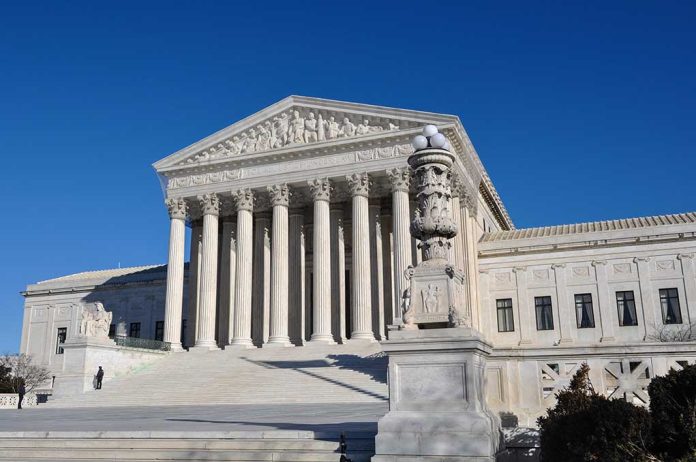
The Supreme Court has handed President Donald Trump consecutive legal victories, allowing continued deportation of Venezuelan migrants and halting reinstatement of thousands of federal employees amid a flurry of ongoing legal challenges.
Key Takeaways
- The Supreme Court allowed the Trump administration to continue deporting Venezuelan migrants using wartime powers, ruling that the lawsuit was filed in the wrong court.
- Chief Justice John Roberts issued an administrative stay pausing a lower-court order that would have required the release of over $1.5 billion in foreign aid.
- The Court halted a lower court order requiring reinstatement of approximately 16,000 dismissed federal employees.
- All nine justices agreed migrants must receive advance notice and opportunity to challenge deportation, potentially limiting future use of the Alien Enemies Act.
- These rulings represent significant legal momentum for the Trump administration’s immigration and government restructuring agendas.
Supreme Court Clears Path for Venezuelan Deportations
The Supreme Court delivered a procedural victory to the Trump administration by allowing continued deportation of Venezuelan migrants under the Alien Enemies Act. In a 5-4 decision, the Court overturned a lower court’s temporary halt on the deportations. The justices determined that the lawsuit challenging these deportations had been improperly filed in Washington, D.C., rather than Texas where the migrants are detained. “The detainees are confined in Texas, so venue is improper in the District of Columbia,” stated the Court in its ruling.
While permitting the deportations to continue, the Court established important conditions. All nine justices agreed that migrants must receive advance notice “within a reasonable time” and have the opportunity to challenge their deportation status. This requirement could potentially impose new restrictions on the administration’s future use of the wartime powers act for immigration enforcement purposes.
🚨🚨 BREAKING: #SCOTUS delivers major victory for @realDonaldTrump's Administration: Can immediately begin deporting gang members again; Judge Boasberg set straight and off the case. Barrett sold out…again. #MAGA #MassDeportation #LiveLifeBoldly pic.twitter.com/n22QennSpy
— Regular Joe (@RegJoeShow) April 8, 2025
The ruling represents a significant victory for the administration’s immigration enforcement strategy, though it comes with procedural guardrails. The Supreme Court’s decision maintains the government’s authority to utilize the rarely invoked Alien Enemies Act while ensuring basic due process for those affected. Immigration advocates have expressed concern about the broad powers granted under the act, which dates back to 1798 and allows deportation of nationals from countries with which the United States is engaged in hostilities.
Foreign Aid Funding Freeze Remains in Effect
In a separate decision marking another victory for the administration, Chief Justice John Roberts issued an administrative stay that pauses a lower court order which would have required the Trump administration to release over $1.5 billion to international aid organizations. The Washington D.C. District Court Judge Amir Ali had previously ordered the unfreezing of funds for the AIDS Vaccine Advocacy Coalition and the Journalism Development Network, organizations affected by the administration’s 90-day halt on foreign assistance.
Roberts’ stay provides the Supreme Court time to review the case in its entirety, with potential outcomes ranging from extending the pause indefinitely to eventually requiring the release of designated funds. This temporary victory aligns with the administration’s stated plans to drastically reduce foreign aid, including cutting over 90% of USAID’s foreign aid contracts and approximately $60 billion in overall U.S. foreign assistance. The funding freeze has reportedly caused financial strain for affected organizations and disrupted humanitarian assistance programs worldwide.
Federal Employee Dismissals Upheld
The Supreme Court extended the administration’s winning streak by halting a lower court order that would have required the reinstatement of thousands of dismissed federal employees. The Court responded to an emergency appeal challenging a California judge’s ruling that had ordered the administration to reinstate approximately 16,000 probationary employees who had been terminated. For now, affected employees across six federal agencies will remain on paid administrative leave while the legal proceedings continue.
This decision represents just one front in an ongoing legal battle over federal workforce changes. A separate lawsuit in Maryland produced a similar ruling blocking the administration’s dismissals, applicable across 19 states and the District of Columbia. The Justice Department has indicated it is appealing that decision as well. These concurrent legal challenges highlight the complexity of the administration’s efforts to reshape federal agencies, a key priority that has faced significant resistance through court challenges.
Legal Momentum Building
The series of Supreme Court decisions signals growing legal momentum for the Trump administration’s policy agenda, particularly in areas of immigration enforcement and government restructuring. Chief Justice Roberts has emerged as a key figure in these decisions, also pausing an order that would have required the return of a Salvadoran immigrant who was accidentally deported. These rulings, while primarily procedural in nature, enable the administration to continue implementing significant policy changes while legal challenges progress through the court system.
The Supreme Court’s decisions collectively reaffirm executive branch authority in areas of immigration and government management, though with important procedural limitations. By requiring proper venue for challenges and maintaining due process requirements, the Court has allowed the administration’s policies to proceed while ensuring judicial oversight remains in place. These developments suggest a potentially favorable legal landscape for the administration as it pursues ambitious policy changes, though final resolutions in many of these cases remain pending further court proceedings.
Sources:
Supreme Court Clears Way for Venezuelan Deportations to Resume, for Now
SCOTUS Hands Trump His First Legal Victory of Second Term
Supreme Court Hands Donald Trump Another Win







